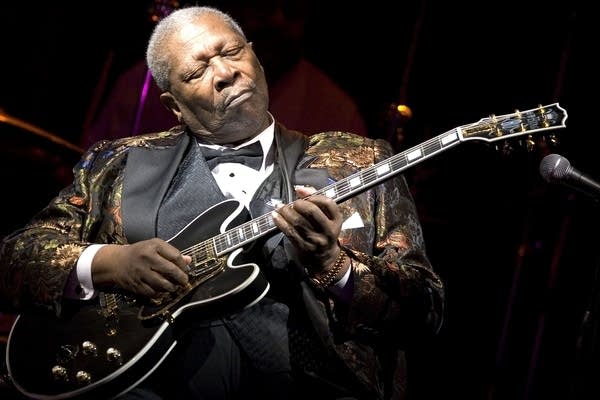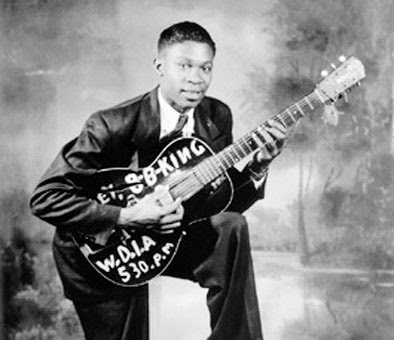
B.B. King: The Reigning Monarch of the Blues
Riley B. King, universally known as B.B. King, stands as one of the most iconic and influential figures in the history of music. His name is synonymous with the blues, a genre he revolutionized and carried to unprecedented heights. Over his nearly seven-decade-long career, King became a beacon of resilience, creativity, and mastery, cementing his legacy as the “King of the Blues.”
Early Life and Influences
B.B. King was born on September 16, 1925, in a small cabin on a cotton plantation in Itta Bena, Mississippi, Riley B. King’s life began under humble circumstances. His parents, Albert and Nora Ella King, were sharecroppers, and the harsh realities of life in the segregated South profoundly influenced him. King’s early exposure to gospel music, particularly through his church, planted the seeds of his musical passion.
.

.
When his mother and grandmother died, King’s childhood took a tumultuous turn. He eventually found solace in music, initially singing in a gospel quartet. A pivotal moment came when he was introduced to the guitar, an instrument that would become his lifelong companion. Early blues legends such as Blind Lemon Jefferson, Lonnie Johnson, and, most notably, T-Bone Walker heavily inspired him. King often cited Walker’s use of the electric guitar as a defining influence that shaped his aspirations.
The Journey to Stardom
In the 1940s, King moved to Memphis, Tennessee, a vibrant hub for the blues. There, he connected with his cousin Bukka White, a well-known blues guitarist who became his mentor. Memphis was the perfect launching pad for King, who began performing on radio shows and at local clubs. It was during this time that he adopted the name “B.B.” which stood for “Blues Boy,” a nod to his youth and the genre he championed.
In 1949, King’s first big break came when he recorded his first single, “Miss Martha King.” Although it wasn’t a commercial success, it marked the beginning of a prolific recording career. The following years saw King’s star rise as he developed his unique style: a combination of intricate single-note runs, soulful bends, and vibrato. These techniques, coupled with his emotive vocals, set him apart from his contemporaries.
The Iconic Lucille
One of the most famous aspects of King’s career is his guitar, Lucille. The story behind the name is a testament to King’s ability to weave narrative into his music. In the 1950s, while performing at a club in Arkansas, a fight broke out over a woman named Lucille. The fight caused a fire, and King, risking his life, ran back into the burning building to save his guitar. From that day on, he named all his guitars Lucille as a reminder to avoid unnecessary risks.
Lucille was more than an instrument; it was an extension of King himself. His Gibson guitar became synonymous with his sound, characterized by the lack of rhythm playing. Instead, King focused solely on lead guitar work, allowing his voice to act as a rhythmic counterpart. This interplay between his guitar and vocals became his hallmark.
Breakthrough and Recognition
B.B. King’s career reached new heights in the 1960s and 1970s, a period that coincided with the blues’ resurgence in popularity. Songs like “The Thrill Is Gone,” “Every Day I Have the Blues,” and “Sweet Little Angel” became classics, earning King both commercial success and critical acclaim.
.
.
“The Thrill Is Gone,” released in 1969, remains one of his most celebrated works. The track’s lush orchestration and heartfelt lyrics resonated with audiences, earning King a Grammy Award. It showcased his ability to blend traditional blues with modern sensibilities, appealing to a broader audience.
During this era, King toured relentlessly, often performing over 300 shows a year. His work ethic and charisma on stage made him a beloved figure worldwide. King’s performances were a masterclass in showmanship and musicianship, as he effortlessly connected with his audiences through humor, storytelling, and soul-stirring music.
Bridging the Gap
One of B.B. King’s most remarkable achievements was his ability to bridge cultural and generational divides. At a time when blues music risked being overshadowed by rock and roll, King’s collaborations with rock musicians reinvigorated the genre. He performed with artists like Eric Clapton, the Rolling Stones, and U2, bringing blues to new audiences and cementing its place in contemporary music.
In 1988, his collaboration with U2 on the song “When Love Comes to Town” introduced him to a younger generation. The track, featured on U2’s Rattle and Hum album, was a testament to King’s adaptability and timeless appeal. Similarly, his partnership with Eric Clapton on the album Riding with the King (2000) was a commercial and critical success, earning him another Grammy.
Legacy and Influence
B.B. King’s influence extends far beyond his music. As an African American artist who achieved global recognition during a time of racial segregation and discrimination, King’s success was a beacon of hope and pride for many. His music, deeply rooted in the African American experience, spoke to universal themes of love, loss, and resilience, making it accessible to diverse audiences.
King’s contributions to music were recognized with numerous accolades. He received 15 Grammy Awards, including a Lifetime Achievement Award. In 1987, he was inducted into the Rock and Roll Hall of Fame, a testament to his impact on not only blues but also rock and roll. King also received the Presidential Medal of Freedom in 2006, one of the highest civilian honors in the United States.
Countless musicians have cited B.B. King as an inspiration, including Eric Clapton, Stevie Ray Vaughan, and Bonnie Raitt. His pioneering guitar techniques have become a staple in blues and rock music, influencing generations of guitarists. King’s signature vibrato and expressive bends are now essential elements of the blues lexicon.
Challenges and Resilience
Despite his monumental success, B.B. King’s life was not without challenges. Growing up in poverty and navigating the music industry during an era of racial discrimination posed significant obstacles. King’s relentless touring schedule also took a toll on his personal life; he was married twice, and both marriages ended in divorce.
Health issues also plagued King in his later years. He battled diabetes for much of his life, a condition he managed with remarkable fortitude. Despite these challenges, King remained committed to his craft, performing well into his 80s. His dedication was a testament to his love for music and his unwavering desire to connect with his audience.
The Final Curtain
B.B. King passed away on May 14, 2015, at the age of 89. His death marked the end of an era, but his legacy lives on through his music and the countless artists he inspired. Tributes poured in from around the world, reflecting the profound impact he had on music and culture.
B.B. King’s funeral, held in Indianola, Mississippi, was a poignant celebration of his life and legacy. Fans, friends, and fellow musicians gathered to pay their respects to the man who had brought so much joy and meaning to their lives. His burial site at the B.B. King Museum and Delta Interpretive Center has since become a pilgrimage destination for music lovers.
Conclusion
B.B. King’s story is one of triumph over adversity, innovation, and unyielding passion. From his humble beginnings in the Mississippi Delta to his status as a global icon, King’s journey is a testament to the transformative power of music. He not only elevated the blues to an art form of universal appeal but also became a symbol of perseverance and excellence.
Through his timeless recordings, unforgettable performances, and enduring influence, B.B. King continues to inspire and captivate audiences around the world. As the “King of the Blues,” his reign is eternal, and his music remains a testament to the enduring power of the human spirit.
Check out B B King on Amazon by clicking here.
Why not check out some of our other articles on great blues musicians here
.


Pingback: Keyboardist Barry Goldberg died January 22, 2025 - Dead Musicians
Pingback: Cool John Ferguson died August 12, 2025 - Dead Musicians